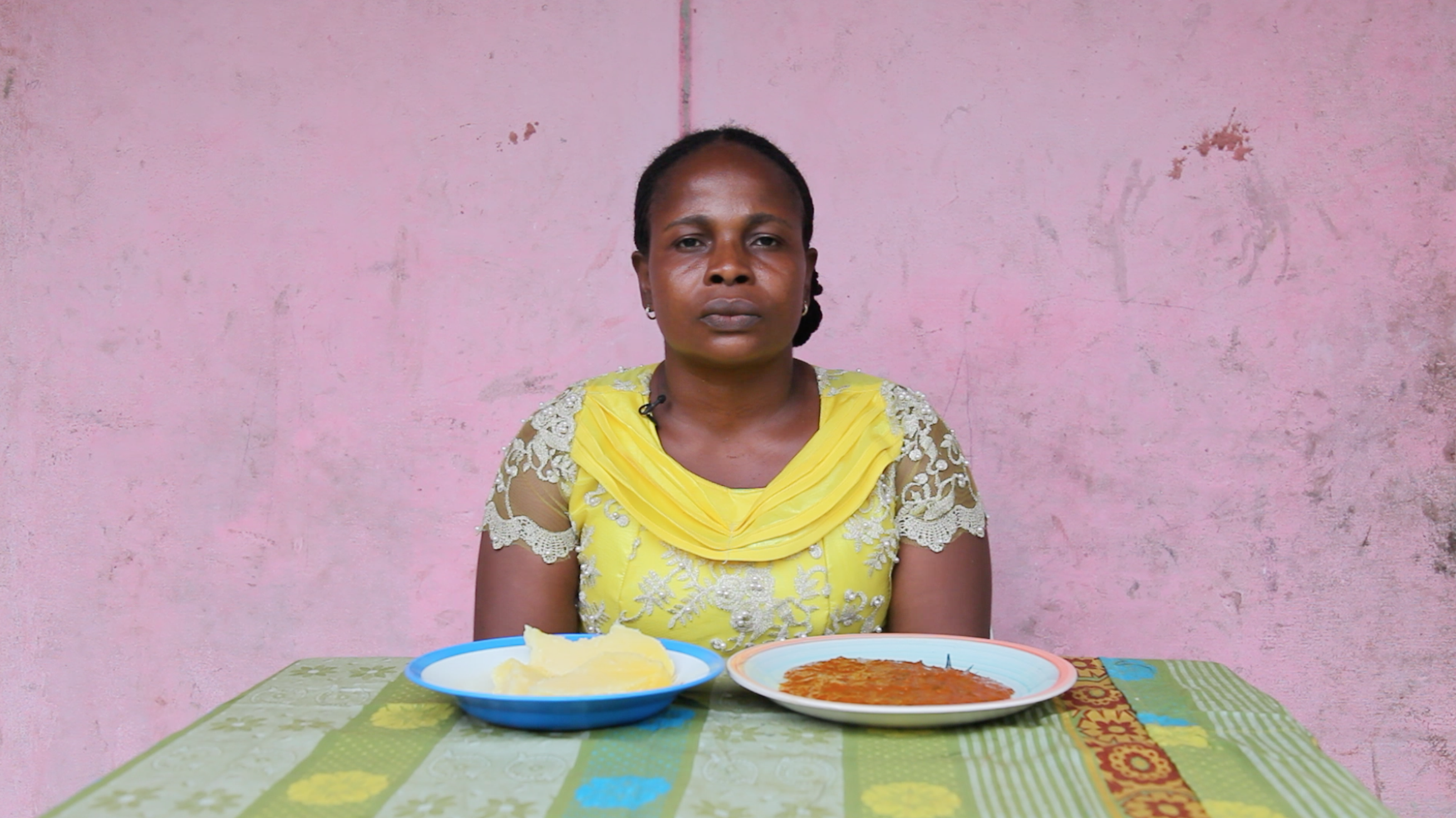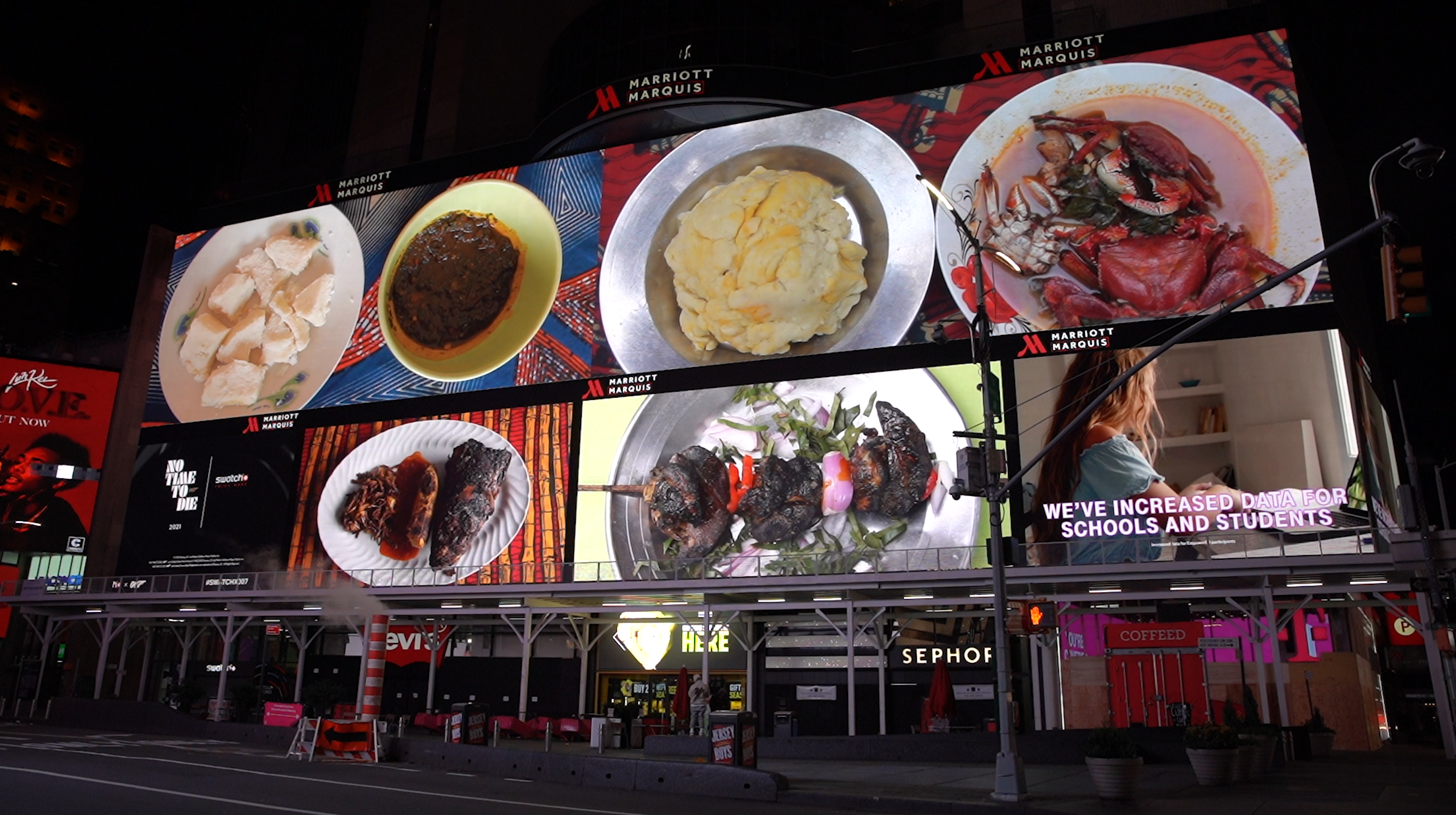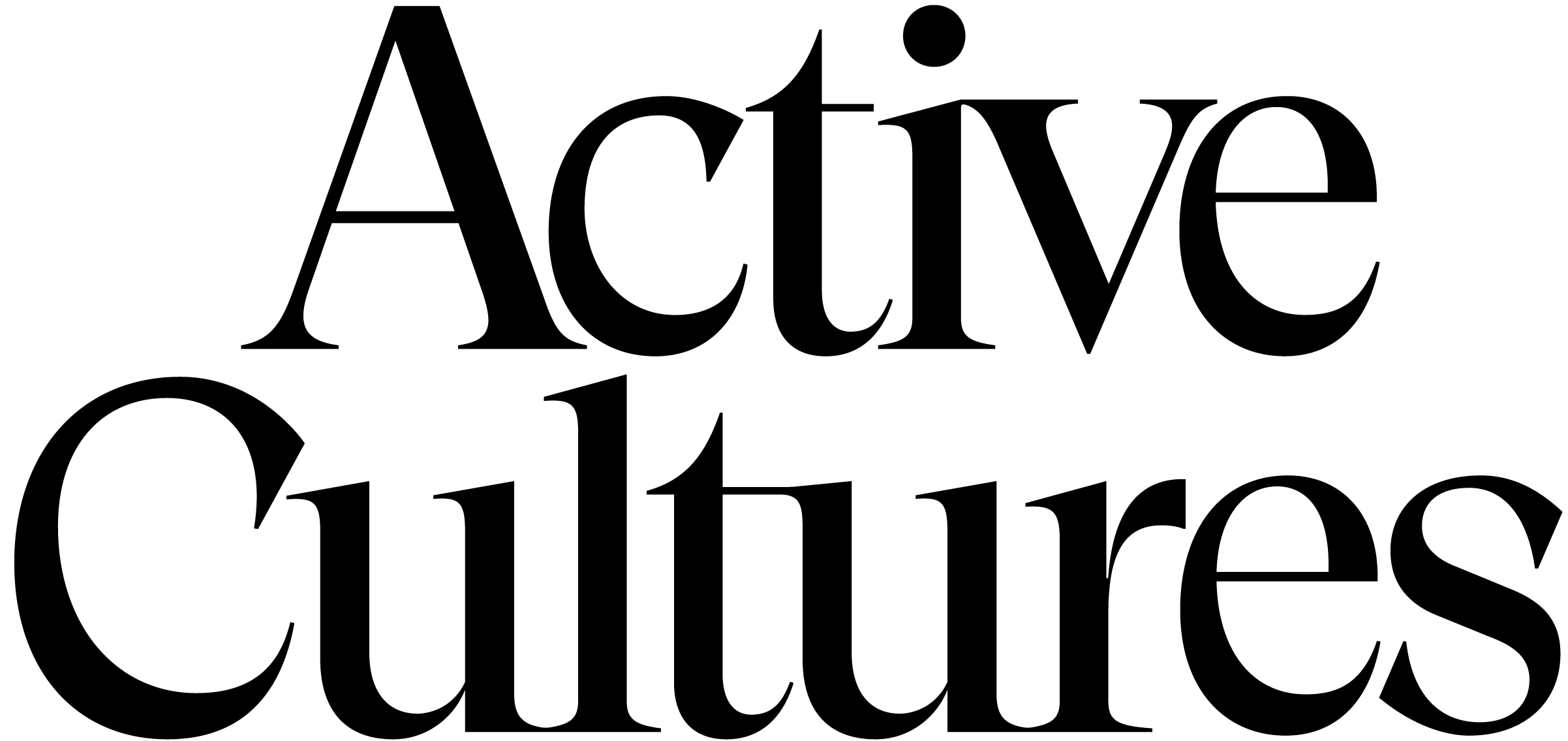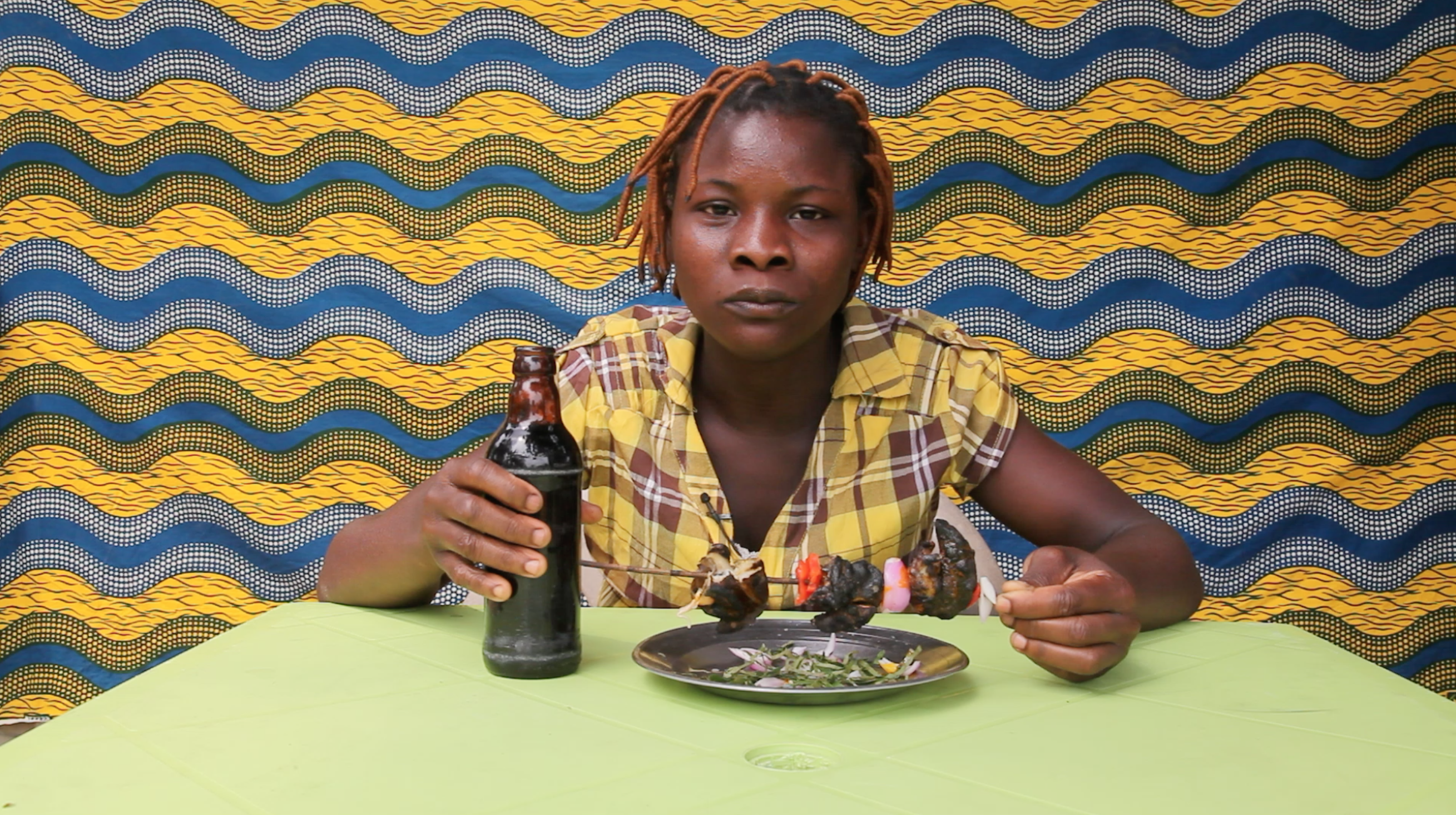"Feasting On History: Zina Saro-Wiwa's Table Manners" was published in Active Cultures' Digest, Issue 08, February 2021.
Images: Zina Saro-Wiwa, Dorcas Eats Roasted Snails and Drinks Maltina; Eucharia Eats Three Leaf Yam and Gho; and LeeleeBari Eats Scotch Egg with Fanta from Table Manners: Season 2, 2019. Video stills. © Zina Saro-Wiwa.
Zina Saro-Wiwa, Table Manners: Season 2, 2019. Video series. © Zina Saro-Wiwa. Installation photos by Megan Stahl and Tatyana Tenenbaum, courtesy of Times Square Arts.
__
Niama Safia Sandy is a New York-based cultural anthropologist, curator, producer, multidisciplinary artist, and educator. Niama's work delves into the human story, often with stories of the Global Black diaspora at its center. She is the Curator-In-Residence at Fridman Gallery, New York and a Visiting Assistant Professor at Pratt Institute. Niama has spoken at and presented programs with Prizm Art Fair, the Schomburg Center for Research in Black Culture, UNTITLED Art Fair, Winter JazzFest, World Around Summit, Creative Time Summit, Harvard University, Oberlin College, and Rhode Island School of Design & more. Her writing has been featured in Artsy, MFON: Women Photographers of the Black Diaspora, NAD NOW, and more. In 2020, Niama helped found The Blacksmiths, a new coalition of culture workers forging support for Black liberation against anti-Black racism in the academy and at presenting institutions. Through The Blacksmiths, Niama has produced resources and public events engaging communities, activists, artists across disciplines, and more to close the gaps in appropriate opportunities for Black artists, curators, and administrators on the global stage. Additionally, Niama is a member of the Wide Awakes and Resistance Revival Chorus, two artists coalitions centering community and collective joy as an act of resistance.
Images: Zina Saro-Wiwa, Dorcas Eats Roasted Snails and Drinks Maltina; Eucharia Eats Three Leaf Yam and Gho; and LeeleeBari Eats Scotch Egg with Fanta from Table Manners: Season 2, 2019. Video stills. © Zina Saro-Wiwa.
Zina Saro-Wiwa, Table Manners: Season 2, 2019. Video series. © Zina Saro-Wiwa. Installation photos by Megan Stahl and Tatyana Tenenbaum, courtesy of Times Square Arts.
__
Niama Safia Sandy is a New York-based cultural anthropologist, curator, producer, multidisciplinary artist, and educator. Niama's work delves into the human story, often with stories of the Global Black diaspora at its center. She is the Curator-In-Residence at Fridman Gallery, New York and a Visiting Assistant Professor at Pratt Institute. Niama has spoken at and presented programs with Prizm Art Fair, the Schomburg Center for Research in Black Culture, UNTITLED Art Fair, Winter JazzFest, World Around Summit, Creative Time Summit, Harvard University, Oberlin College, and Rhode Island School of Design & more. Her writing has been featured in Artsy, MFON: Women Photographers of the Black Diaspora, NAD NOW, and more. In 2020, Niama helped found The Blacksmiths, a new coalition of culture workers forging support for Black liberation against anti-Black racism in the academy and at presenting institutions. Through The Blacksmiths, Niama has produced resources and public events engaging communities, activists, artists across disciplines, and more to close the gaps in appropriate opportunities for Black artists, curators, and administrators on the global stage. Additionally, Niama is a member of the Wide Awakes and Resistance Revival Chorus, two artists coalitions centering community and collective joy as an act of resistance.
It is November 2020. I am in New York City at the corner of West 47th Street and 7th Avenue, just before midnight.
There they are, eight stories above my head on brightly lit screens in Times Square, the people of Ogoniland, from the Niger River Delta in the southern region of Nigeria. Larger-than-life. Majestic. Vibrant. Quite frankly, beautiful. And nourished, above all, through the sublimely plated culinary traditions of their culture also on display.
Figured through the lens of Nigerian artist Zina Saro-Wiwa, these people are a part of Table Manners (2014-2019), a video series installed for Times Square Arts Alliance's Midnight Moment series in collaboration with Brooklyn-based gallery Medium Tings. Watching these people eat it is clear to me they are not simply performing. None of them are precious about eating their meals. It's an all fingers, teeth, and tongue affair to bring the morsels to their mouths. Their enjoyment is palpable. Some eaters lick their fingers. One of the male eaters doesn't seem to chew some parts of his meal at all. My mind begins to wander and I wonder about how some of these dishes I've never seen or eaten before might feel against my own fingers, on the membranes of my mouth. Later at home, watching the full versions of the videos with audio, I find that the crunchy, unctuous, and at times onomatopoeic sounds of eating season the videos with an important dimension.
The plates themselves are almost distractingly beautiful with their rich hues and textures. Dishes including hairy-leg crab pepper soup with pounded yam, roasted snails, roasted cocoyam (malanga), and palm oil; beef and pumpkin leaf soup with loiloi (pounded cassava); plantain porridge with periwinkle (a West African sea snail, also known as the "mud creeper"); garden eggs (a kind of miniature eggplant); spicy ground nut butter and more are presented for consumption. Two of the diners drink palm wine and maltina respectively. It is clear that this is a kind of gustatory experience that exceeds the delicacies before them. There is something more at stake here.
Each diner gazes directly at Saro-Wiwa's lens. They are multigenerational. Some smiling, others presenting a casual expression. Diving into the individual videos at home, it feels like their eyes all lock with mine as I watch, an intimacy I missed at the installation site. Their gazes feel at once confrontational and communal. It was the kind of looking that, coupled with the food, seemed to be an effort toward connection. I found myself wondering what they experience in their everyday lives. I learn their names: Precious, Gideon, Felix, Doole, Grace, Friday, Felicia, Alex, Barisuka, Eucharia, and Dorcas. Watching the sinews of their fingers as they eat, I begin to feel like I know them. In some of the videos, there are faint ambient sounds of children playing, and cars honking in the background. If I close my eyes, I can place myself at the table with them long enough to smell the aromas of the meals. I am reminded that food is not merely a function of nourishing the body, but the spirit too.
When I look at artwork I'm always trying to connect it to context. The context of the artist's life and other work, the subjects' lives, whatever might be relevant. Here the critical morsel of context is that the artist Zina Saro-Wiwa is a daughter of Ken Saro-Wiwa. Executed by a Nigerian military junta in 1995 with eight other Ogoni leaders, the elder Saro-Wiwa was a journalist and leading environmental activist who sought to raise awareness and rally support to address the extreme oil pollution and negligence in Ogoniland by Shell Oil. Among his concerns was appropriate compensation to the Ogoni people for the resources being extracted from their lands. According to the Nigerian Extractive Industries Transparency Initiative (NEITI), today, the country's oil and gas revenue accounts for 65% of the government's total revenue.
Between 1976 and 1991, there were also a staggering 2,976 oil spills in the Niger River Delta on the lands of the Ogoni people, according to Friends of Earth International. In that time, over two million gallons of oil leaked into the water and the very soil itself, causing water contamination, degradation of safe food sources, severe health issues to the population, and other damage to the ecosystem. Although Shell no longer directly cultivates oil in the area, their pipelines still crisscross Ogoniland. Oil spills continue because of leaks in the pipelines and theft from bandits siphoning resources to sell.
There they are, eight stories above my head on brightly lit screens in Times Square, the people of Ogoniland, from the Niger River Delta in the southern region of Nigeria. Larger-than-life. Majestic. Vibrant. Quite frankly, beautiful. And nourished, above all, through the sublimely plated culinary traditions of their culture also on display.
Figured through the lens of Nigerian artist Zina Saro-Wiwa, these people are a part of Table Manners (2014-2019), a video series installed for Times Square Arts Alliance's Midnight Moment series in collaboration with Brooklyn-based gallery Medium Tings. Watching these people eat it is clear to me they are not simply performing. None of them are precious about eating their meals. It's an all fingers, teeth, and tongue affair to bring the morsels to their mouths. Their enjoyment is palpable. Some eaters lick their fingers. One of the male eaters doesn't seem to chew some parts of his meal at all. My mind begins to wander and I wonder about how some of these dishes I've never seen or eaten before might feel against my own fingers, on the membranes of my mouth. Later at home, watching the full versions of the videos with audio, I find that the crunchy, unctuous, and at times onomatopoeic sounds of eating season the videos with an important dimension.
The plates themselves are almost distractingly beautiful with their rich hues and textures. Dishes including hairy-leg crab pepper soup with pounded yam, roasted snails, roasted cocoyam (malanga), and palm oil; beef and pumpkin leaf soup with loiloi (pounded cassava); plantain porridge with periwinkle (a West African sea snail, also known as the "mud creeper"); garden eggs (a kind of miniature eggplant); spicy ground nut butter and more are presented for consumption. Two of the diners drink palm wine and maltina respectively. It is clear that this is a kind of gustatory experience that exceeds the delicacies before them. There is something more at stake here.
Each diner gazes directly at Saro-Wiwa's lens. They are multigenerational. Some smiling, others presenting a casual expression. Diving into the individual videos at home, it feels like their eyes all lock with mine as I watch, an intimacy I missed at the installation site. Their gazes feel at once confrontational and communal. It was the kind of looking that, coupled with the food, seemed to be an effort toward connection. I found myself wondering what they experience in their everyday lives. I learn their names: Precious, Gideon, Felix, Doole, Grace, Friday, Felicia, Alex, Barisuka, Eucharia, and Dorcas. Watching the sinews of their fingers as they eat, I begin to feel like I know them. In some of the videos, there are faint ambient sounds of children playing, and cars honking in the background. If I close my eyes, I can place myself at the table with them long enough to smell the aromas of the meals. I am reminded that food is not merely a function of nourishing the body, but the spirit too.
When I look at artwork I'm always trying to connect it to context. The context of the artist's life and other work, the subjects' lives, whatever might be relevant. Here the critical morsel of context is that the artist Zina Saro-Wiwa is a daughter of Ken Saro-Wiwa. Executed by a Nigerian military junta in 1995 with eight other Ogoni leaders, the elder Saro-Wiwa was a journalist and leading environmental activist who sought to raise awareness and rally support to address the extreme oil pollution and negligence in Ogoniland by Shell Oil. Among his concerns was appropriate compensation to the Ogoni people for the resources being extracted from their lands. According to the Nigerian Extractive Industries Transparency Initiative (NEITI), today, the country's oil and gas revenue accounts for 65% of the government's total revenue.
Between 1976 and 1991, there were also a staggering 2,976 oil spills in the Niger River Delta on the lands of the Ogoni people, according to Friends of Earth International. In that time, over two million gallons of oil leaked into the water and the very soil itself, causing water contamination, degradation of safe food sources, severe health issues to the population, and other damage to the ecosystem. Although Shell no longer directly cultivates oil in the area, their pipelines still crisscross Ogoniland. Oil spills continue because of leaks in the pipelines and theft from bandits siphoning resources to sell.




Table Manners presents us with a cultural and spiritual space bound up with all of this history—the very story of Ogoniland itself and its people, before, during, and beyond this singular episode of environmental devastation. Food writer and culinary historian Michael Twitty has said "the kitchen acts as a site of memory and tradition." The dishes in Table Manners represent not just nourishment of the body but a portal of connection to tradition and community. These dishes are a direct line not only to the hands that prepared them but to the hands who tilled the land, and fished the Niger River before any of us were ever a thought. To eat the food of your ancestors is to call them to you, to remember who you are, to remember the soil that grew you. It is to place yourself as an object in history, in the great cycle of life.
Mounting this video series at one of the most iconic landmarks in the Western world is a masterful act of transfiguration. By exploding the scale of her videos and placing the bodies of the people affected by one of the most devastating ecological crises in modern history in Times Square, Saro-Wiwa is celebrating a kind of resilience many people will never have to know firsthand. It is a veneration, a vindication of the Ogoni. For the viewer, it is a confrontation and recontextualization of notions of community and history—their implications and the commitments they would require from us. The installation opened to the public on Monday, November 2, the eve of the 2020 U.S. Presidential Election, yet another battle for this country's soul. We hoped, but we did not know which way the pendulum would swing. It's as if Saro-Wiwa was encouraging us toward the development of the tools we would need to move forward either way: something that would allow us to withstand even more unfathomable darkness or to build ourselves a path that would break the hold of the worst parts of our history to lead us out of it. Months later, we know that the path forward needs another sort of nourishment.

